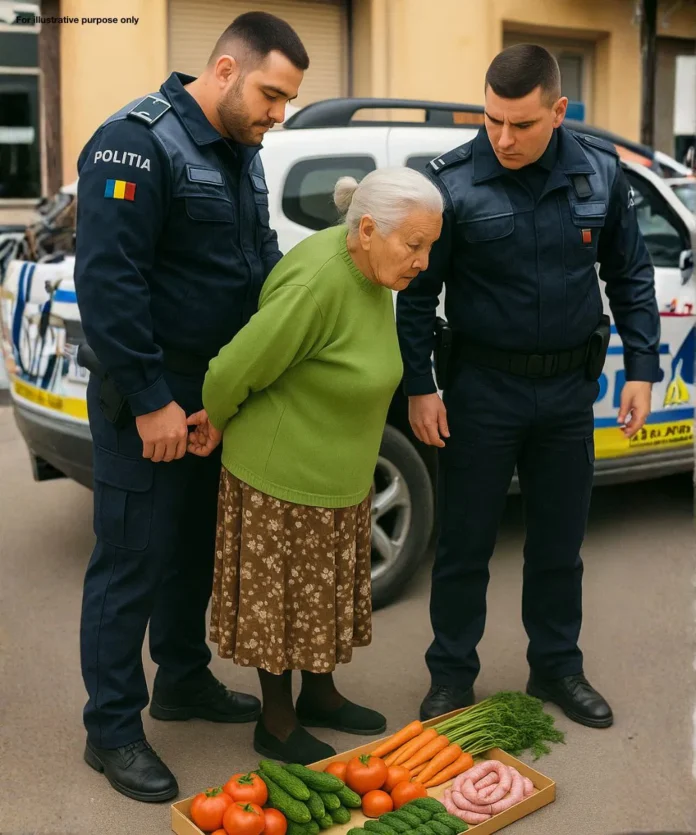On a quiet afternoon, two patrol officers received a call about illegal trading taking place at a crowded city intersection. The report sounded routine — one of those small neighborhood issues they often resolved with a warning and a kind word.
When they arrived, they expected to find a group of unlicensed vendors or maybe a street stall blocking traffic. Instead, they found something very different.
A frail elderly woman stood alone beside a wooden crate filled with freshly picked vegetables. Her tomatoes were plump and red, her carrots bright and clean, her cucumbers neatly lined in rows. The afternoon sun reflected off her wrinkled face, framed by a faded headscarf. She looked like someone’s grandmother — gentle, quiet, and harmless.
The senior officer approached slowly. “Ma’am,” he said with a warm but firm tone, “you know you’re not allowed to sell goods on the street without a permit, right?”
The old woman smiled politely and nodded, her hands trembling slightly. “I know, officer,” she said softly. “But I’m not trying to cause trouble. My son is sick. I just need enough money to buy his medicine. These vegetables — I grew them myself.”
Her voice cracked as she spoke. For a moment, the officers didn’t know what to say.
Technically, she was breaking the law, but she didn’t look like a criminal. She looked like a mother doing her best in a world that had forgotten her.
Compassion Before Suspicion
The younger officer turned to his partner. “She’s not hurting anyone,” he murmured. “Let’s give her a warning and move on.”
The senior officer sighed. “All right. But, ma’am,” he said kindly, “please try to find another way to earn money. Not everyone will be as understanding as we are.”
The old woman’s face softened with relief. “Thank you, officer. You’re very kind,” she said quickly. But her eyes darted toward the crate as if she was hoping they would leave soon.
As the officers turned to go, the younger one smiled. “Since we’re already here, maybe we can buy something from you. Let us help a little.”
Her reaction came too fast. “Oh no, son, that’s not necessary. I already have enough customers.”
He frowned. “Customers? I don’t see anyone else here.”
“They come early in the morning,” she said, forcing a laugh. “You just missed them.”
Something about her voice — the way it shook slightly, the way she looked down as she spoke — made him pause.
“Then I’ll still take a couple of tomatoes,” he said, trying to keep the mood light.
Her expression changed. “No, really,” she said firmly. “Save them for others.”
The officers exchanged a look. Something was wrong.
The Discovery That Changed Everything
Trusting his instincts, the younger officer bent down and picked up one of the tomatoes. It was firm and fresh, just like the others. But as he turned it in his hand, something caught his eye — tiny, almost invisible puncture marks near the stem.
He frowned, examining another tomato. The same marks.
“Sir,” he said quietly, showing it to his partner. “Look at this.”
The older officer took one glance — and his face darkened. “Ma’am,” he said, his voice no longer gentle, “where did you get these vegetables?”
The old woman froze. “I told you,” she stammered. “I grew them myself.”
He shook his head. “No. These have been tampered with.”
Within seconds, the tone of the encounter shifted entirely. The officers moved closer. “Ma’am, I’m afraid we need to take a closer look at your goods,” the senior officer said.
Her lips trembled. “Please, I’m just trying to survive,” she whispered.
The younger officer reached for another tomato and carefully sliced into it with his pocketknife. Hidden inside the pulp was a tiny plastic capsule — barely visible, sealed tightly.
“Arrest her,” the senior officer said quietly.
The words hung heavy in the air. The woman gasped, her knees giving way. “No, please,” she cried. “I didn’t mean to harm anyone!”
But it was too late. The officers had already radioed for backup.
The Truth Behind the Stall
The investigation that followed revealed a shocking truth that spread through the department like wildfire.
The elderly woman wasn’t a harmless street vendor at all. Her small vegetable stall was a cover for a clever smuggling operation. Inside those tomatoes, cucumbers, and carrots were tiny capsules filled with illegal substances.
Her son — the one she claimed was sick — was, in fact, the one producing the materials at home. Disabled and rarely seen in public, he used his mother’s sympathetic appearance to disguise their operation. No one would ever suspect a trembling old woman selling vegetables on the street.
Neighbors later said they often saw her tending her small garden and thought she was simply trying to make ends meet. She greeted everyone with a kind smile, always offering fresh produce at a discount. But behind that gentle exterior, a hidden network was operating — one that had evaded police surveillance for months.
Investigators found more than just vegetables in her home. They uncovered packaging equipment, small syringes, and dozens of crates prepared for delivery. The substances were carefully hidden inside hollowed-out vegetables — each one appearing flawless on the outside.
The officers who first found her were deeply shaken. The young officer, who had felt compassion moments earlier, couldn’t stop thinking about how close they had come to walking away.
“She looked like my grandmother,” he later told reporters. “I wanted to help her. I thought I was doing the right thing. But it turns out kindness nearly blinded me to the truth.”
The Lesson That Shocked a Community
When the news broke, it stunned the local community. People couldn’t believe that the same elderly woman they had often seen smiling on the street corner had been running something so dangerous behind her kind face.
Social media filled with comments ranging from disbelief to sorrow. Many expressed pity for her, others anger. Some simply mourned how often evil hides behind innocence.
The police department later issued a public statement, reminding citizens that appearances can be deceiving.
“It’s easy to feel sympathy,” the statement read, “but our duty is to look beyond what the eyes can see. This case reminds us that compassion must always be balanced with caution.”
The old woman and her son were both taken into custody pending further investigation. Authorities confirmed that their operation had been running for months, possibly longer.
In her confession, she reportedly said she had agreed to help her son out of love and desperation. “He’s all I have,” she said tearfully. “I didn’t want him to suffer.”
A Sad Reflection on Desperation and Deception
Stories like this one resonate deeply, especially with older readers who have seen the world change through decades of hardship and survival. Many understand what it means to do whatever it takes to care for a family member in need.
But this story also serves as a warning — a painful reminder that love, when mixed with desperation, can lead to dangerous choices.
The officers involved in the case have since spoken about the fine line between compassion and vigilance. Their experience is now part of police training discussions about situational awareness and judgment during community patrols.
“It’s not about losing empathy,” one officer explained. “It’s about seeing the whole picture. You can feel sorry for someone and still do your job. Sometimes the truth is buried right beneath what looks innocent.”
In the end, what began as an ordinary call about street vending turned into a lesson that will stay with everyone who witnessed it. A reminder that even the gentlest faces can hide painful secrets — and that sometimes, the greatest danger is found where you least expect it.



